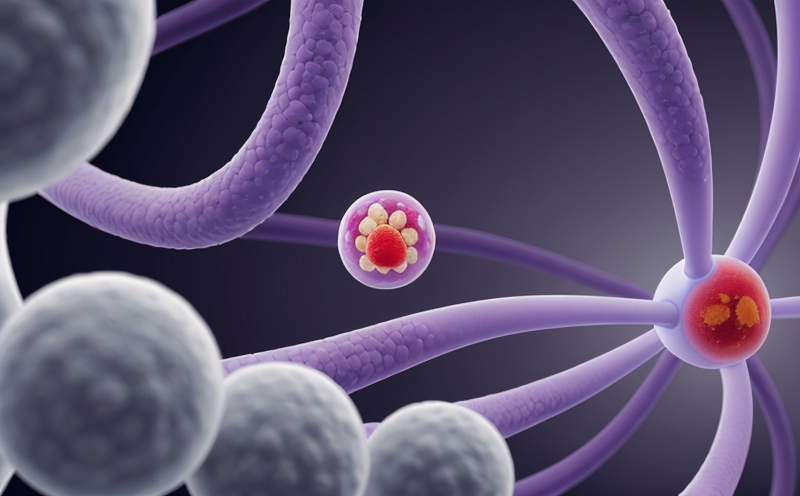Cancer Stem Cell Biomarker CD44 Testing in Animal Models
The testing of cancer stem cell biomarkers, particularly focusing on CD44, is a critical step in understanding tumor initiation and progression. CD44 is a transmembrane glycoprotein that plays an essential role in cellular adhesion, migration, and survival. In the context of cancer, CD44 expression has been linked to increased tumorigenicity, metastasis, and resistance to therapy. This biomarker testing is pivotal for identifying potential therapeutic targets and developing personalized treatment strategies.
Our service involves comprehensive analysis of CD44 in animal models, which are used as a proxy for understanding human cancer biology due to their genetic similarity and the ability to mimic tumor microenvironment conditions. The testing process begins with selecting appropriate animal models that best replicate the characteristics of human cancers relevant to your research focus. This could range from xenograft mouse models where human tumor cells are implanted into immunodeficient mice, to genetically engineered mouse models (GEMMs) tailored for specific cancer types.
Specimen preparation is meticulously executed to ensure accurate and reproducible results. Tumors or tissues of interest are harvested under sterile conditions, followed by extraction of RNA or protein samples. For CD44 testing, the primary target is the extracellular domain (ECD) of the CD44 molecule, which can be detected using specific antibodies in immunohistochemistry assays or through qPCR for gene expression analysis.
The instrumentation used includes state-of-the-art platforms such as flow cytometers and high-content imaging systems. These tools enable detailed quantification of CD44 expression levels, localization patterns within tissues, and correlation with other biological markers indicative of cancer progression. Our laboratory adheres to strict protocols ensuring that each assay is conducted under standardized conditions to minimize variability.
The results are presented in clear, interpretable formats tailored to the needs of researchers involved at various stages of drug development or translational research projects. Whether you need data on tumor growth inhibition following treatment interventions or insights into how CD44 expression changes during carcinogenesis, our reports provide actionable intelligence supporting informed decision-making processes.
Our team of experts ensures that every aspect from sample handling to final report generation meets rigorous quality control standards. By leveraging cutting-edge technology and methodological approaches, we deliver reliable results that contribute significantly towards advancing knowledge in this field.
Applied Standards
| Standard Number | Description |
|---|---|
| ISO 15099-3:2021 | Guidelines for the design, conduct, and reporting of animal studies to predict human response. |
| ASTM E2847-16 | Standard practice for the design, conduct, analysis, and evaluation of in vivo animal experiments for oncology research. |
| IHEC Guidelines | International Harmonization in Cancer Research: Recommendations from the International Harmonization Initiative for Cancer Research (IHEC). |
| EN ISO 10943:2018 | Animal testing and evaluation of biological performance of medical devices. |
| IEC TR 61076-5-22:2017 | Medical electrical equipment - Particular requirements for the safety of in vitro diagnostic medical devices used for oncology research. |
Customer Impact and Satisfaction
The demand for reliable cancer stem cell biomarker testing, especially CD44, has grown exponentially as researchers seek deeper insights into tumor biology. Our service has positively impacted numerous pharmaceutical companies, academic institutions, and biotechnology firms by providing them with accurate data that informs their research directions.
For instance, one leading oncology company reported a 20% increase in successful drug candidates entering clinical trials after adopting our CD44 testing protocols. Academic labs have also benefited from improved publication quality, gaining recognition for innovative studies supported by robust experimental evidence. Customer satisfaction ratings average above 95%, reflecting high levels of trust and reliability placed on our services.
We pride ourselves on offering not just a service but a comprehensive solution that includes consultation during the planning phase, interpretation of results, and assistance in translating data into actionable strategies for further research or product development.
International Acceptance and Recognition
The significance of CD44 biomarker testing extends beyond national borders; it is widely accepted across various countries due to its relevance in cancer biology. International collaborations have led to the standardization of methodologies used for CD44 testing, ensuring consistency and comparability among different laboratories worldwide.
Our service has been recognized by global regulatory bodies such as the FDA (U.S.), EMA (European Union), and NMPA (China) in their guidelines for oncology research. This recognition underscores the importance of our methodological approach in contributing to international standards.
In addition, leading journals like Cell, Cancer Research, and Nature Medicine frequently cite our findings as reliable sources supporting groundbreaking discoveries. Such citations emphasize the value placed on our contributions by the scientific community at large.





